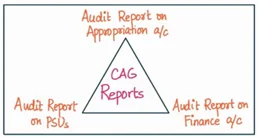Answer:
| Approach:
Introduction
- Introduce the Comptroller and Auditor General (CAG) as a constitutional authority derived from Article 149 of the Indian Constitution.
Body
- Discuss the different types of audits conducted by the CAG, focusing on the performance audit and its relevance to government policy implementation.
- Explain that the CAG’s audit does not interfere with the policy-making process but evaluates the effectiveness, efficiency, and economy of the government’s policies and operations.
Conclusion
- Conclude, emphasizing the CAG’s vital role in enhancing the overall effectiveness and accountability of the government’s operations.
|
Introduction:
The Comptroller and Auditor General (CAG) of India is a constitutional authority derived from Article 149 of the Indian Constitution. The CAG’s primary role is to audit the accounts of the Union and the States, ensuring transparency, accountability, and efficient utilization of public funds.
Body:
While the CAG is mandated to scrutinize the accounts and financial transactions of the government, the question arises whether the audit of government policy implementation could amount to overstepping its jurisdiction.

- To discuss this, it is essential to understand the nature of the CAG’s audits:
- Financial Audit: The CAG audits the accounts and financial statements of the government to ensure accuracy, legality, and compliance with established financial rules and regulations.
- Compliance Audit: The CAG examines whether the government’s activities, operations, and procurement processes comply with the relevant laws, regulations, and policies.
- Performance Audit: The CAG assesses the effectiveness, efficiency, and economy of government programs, policies, and operations in achieving their intended objectives.
- The performance audit, in particular, may appear to touch upon the government’s policy implementation. However, it is important to note that the CAG’s audit is focused on evaluating the outcomes of policy implementation rather than questioning the policy itself.
- The CAG does not interfere with the government’s policy-making process, which remains the exclusive domain of the executive branch. Instead, the CAG’s role is to provide an independent and objective assessment of whether the government’s policies have been implemented effectively and efficiently, in line with the intended goals and objectives.
- In this context, the audit of government policy implementation by the CAG does not amount to overstepping its jurisdiction. The CAG’s audits contribute to improving governance, transparency, and accountability by highlighting areas of inefficiency, irregularities, or non-compliance, thus enabling the government to take corrective measures and improve its policy implementation process.
Conclusion:
By evaluating the outcomes of policy implementation and identifying areas for improvement, the CAG plays a vital role in enhancing the overall effectiveness and accountability of the government’s operations.
